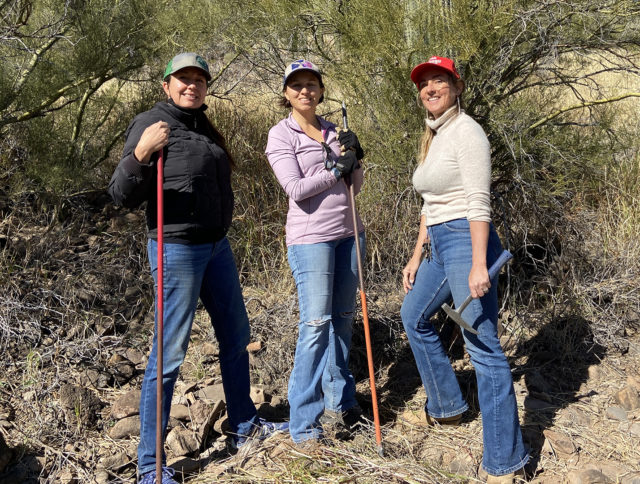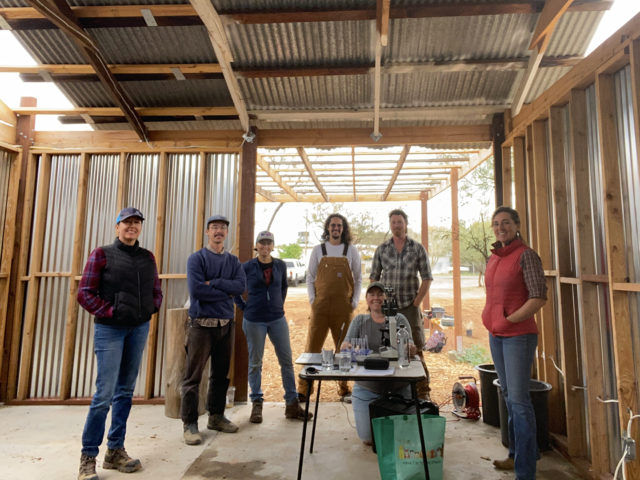Diverse leadership and gender equity are essential to innovation and success when it comes to tackling climate change and building healthier communities.
Today is International Women’s Day, and we are checking in with Blue Baldwin, the recipient of a Growing Water Smart technical assistance grant made possible with support from Planet Women. We introduced her in the Women in Resilience Spotlight in December. Since then, her Green Stormwater Infrastructure (GSI) team at the City of Tucson has been busy. She shares with us about gender equality, research, compost, and progress toward building green stormwater infrastructure installations at Gunny-Barreras Park to reduce flooding and improve the community space with healthy desert plants.

A majority of women on the team
The theme of International Women’s Day 2022 is Break the Bias. We asked Blue how her team strives to bring more equality to their landscape restoration work. “While women account for a large portion of employees in the public sector in local governments, they are underrepresented in decision-making roles. Meanwhile, women are also scarce in industries like landscape design, construction, and maintenance, which are the pillars of Green Stormwater Infrastructure,” says Blue Baldwin. “The GSI team at the City of Tucson defies these traditional shortages because our team is mostly women,” and women hold three key leadership roles on the team.
“We often find ourselves being the only women in the room as we work across City departments with everyone from groundskeepers to the highest levels of leadership.” she continues. Blue describes the team as “undaunted, if not motivated by the challenge of our circumstances.” Their approach yields results. “Our willingness to be transparent about our skill sets, perspectives, and priorities; our desire to collaborate rather than control; and our penchant for open and easy communication have laid the groundwork for many successful GSI projects,” explains Blue.
Learning at the farm
A visit to Drylands Alliance Addressing Water Needs (DAAWN) working farm demonstrates the power of compost tea, a biological soil amendment. DAAWN’s product is one that “we will be utilizing in our turf management pilot project at Gunny-Barreras Park,” says Blue. To make it, she says, “compost is made with a traditional 1:30 ratio of greens (nitrogen) to browns (carbon) and allowed to decompose. The final step is adding the mix to water.” The tea is a concentrated liquid of beneficial fungi and bacteria. “Once applied, the microbial life changes the texture and nutrient content of the soil, creating conditions for plants to grow healthier and more abundantly,” she describes. We can’t wait to see how it works at the park.

Scientific interest and support
The team’s work at CSM Martin Gunny-Barreras Park is drawing attention. Two soil health scientists from the University of Arizona, Dr. Laura Meredith, assistant professor of ecosystem genomics in the School of Natural Resources and the Environment (SNRE) and the BIO5 Institute, and Dr. Vanessa Buzzard, senior research specialist at SNRE, are interested in studying the green infrastructure installations here and at other locations. The scientists (more awesome women!) hope to reveal changes in physical, chemical, and biological health indicators of the soil in response to GSI. “The valuable information they provide about biological soil amendments will help us to be more exact in the way we replicate our techniques in the future,” says Blue. The scientific data will improve how turf is maintained in water-efficient ways, an ever-growing need in cities that rely on Colorado River water.
Another leading woman
Blue recognizes her colleague, Lara, as an integral woman in sustainability and public service. Lara Hamwey is the director of Tucson’s Parks Department. After just a year in the role, she is already bringing innovation to the department by supporting projects like the Green Stormwater Initiative.
Before joining the City of Tucson, Lara worked at the City of Miami Parks and Recreation Department where she was appointed the first-ever female director after many years of service. As a woman who has held leadership roles traditionally occupied by men, she is familiar with biased perceptions. “I focused on pursuing outcomes and proving my commitment,” says Lara.
Enacting environmentally friendly options can be challenging when managing over 3,300 acres across 140+ parks and public spaces in Tucson. However, Lara says, “Throughout my career, I have had the benefit of seeing conservation, environmental stewardship, and climate response gain traction, which enables me to understand not only the why, but also the why now.” We must adapt and adopt resilient practices in our parks and communities.
“Throughout my career, I have had the benefit of seeing conservation, environmental stewardship, and climate response gain traction, which enables me to understand not only the why, but also the why now.”
–Lara Hamwey, Director, Tucson Parks and Recreation
The importance of women in conservation
The Growing Water Smart team at Sonoran Institute, the City of Tucson’s Green Stormwater Infrastructure team, and Planet Women promote diverse women leaders in conservation. Research shows that diverse leadership and gender equity are essential to innovation and success when it comes to tackling climate change, protecting the environment, and building healthier communities. Happy International Women’s Day.
Blog post by Corinne Matesich, marketing communications manager.
